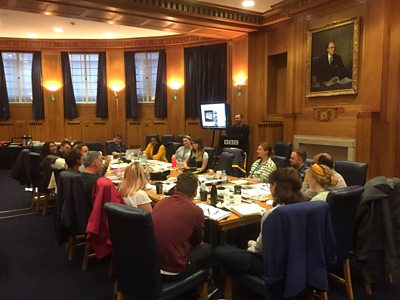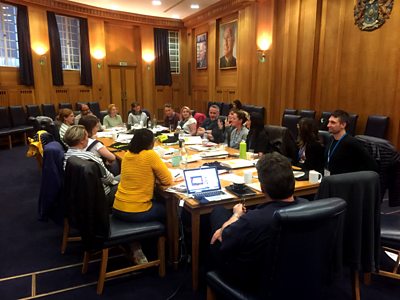Comedy is at its heart a social activity. So being the only writing duo to take part in this year’s Comedy Room, we may be at an advantage. For example, if someone tells a funny joke in the woods and no one’s there to hear it, is it funny? Is it even a joke? Or is it someone standing in the woods, talking to themselves, being a bit creepy? Now if two people are in the woods telling jokes, well that just seems like good wholesome fun, I'm sure you can agree.
Before we go any further, we should introduce ourselves. We’re (Hickman) and Steve (Robertson), a couple of writers based in the North East. We were asked to write about our experiences, having attended our first day as part of the Comedy Room. And as the incredibly literal lads we are, we'll start at the beginning...

The day began in a hotel in Stratford. Having just helped ourselves to the complimentary breakfast buffet, we scoured the room for others we thought might also be comedy writers. Seeing people sitting alone, looking vaguely familiar from the brief glance we got at their bios, we contemplated going over. But the thought of how cringe-inducing it would be if they weren't who we thought they were, kept us firmly in our seats.
We took the Central line in during morning rush hour. We're sure there's an analogy about things crammed into tins... no, it's gone. The entire journey, we were muttering “I couldn’t do this every day” to each other. But as we headed into the grand reception of Old Broadcasting House, our muttering became more of a “Ooh, I could actually quite get used to this”.
It felt like being back at school, waiting to meet our new classmates. But as people arrived, any apprehension we felt quickly evaporated. Turns out everyone's really nice. We even spotted a few familiar faces from the breakfast buffet, who'd likewise considered approaching vaguely familiar strangers. Good to know social awkwardness isn't exclusive to us.
We’re an eclectic bunch, from all over the country, different backgrounds and very different comedy paths travelled. And it quickly became apparent that as nice as everyone was, they were all well funny too.

As we settled in for the day in some sort of epic ±«Óătv boardroom, Simon Nelson and Amanda Farley – our Comedy Room parents – laid out our first day and beyond. The first session was with writer and stand-up, – an introduction to writing for topical radio. Something we'd tried before. And failed at. We'd spent a whole day trying to come up with gags for ±«Óătv Radio 4 Extra’s Newsjack, resulting in a solitary fart joke. Which not only stunk, but was about as topical as The Millennium Bug. We figured you either had the knack or you didn't. And we most certainly did not.
However, as Grainne explained how she finds the funny, the whole thing started to make some sense. Writing jokes is like working out. The more you do it, the faster and stronger you get at it. The newspapers were handed out and we set about finding stories that were ripe for the comedy picking. Yes, we might have something funny to say about Brexit and Trump, but so does everyone else. A story that is already weird and funny is already weird and funny, so it's actually quite hard to write a joke about that. And it's also tough to write something funny about something you care deeply about too.

Grainne told us to look for the more obscure stories – the things most people might overlook. Under her guidance, we broke one such article down into three elements. In our case, it was royalty, retirement and horses. We were sceptical – there were no jokes here, surely? But as we began to freely associate, making connections to each element, asking ourselves what was weird about the story, what was scary and stupid, mixing in other topical stuff such as film releases and celebrity gossip – the gags emerged.
As we went around, sharing our jokes with the rest of the group, it was eye-opening how many different angles you could approach the same story from – none of them obvious and most of them hilarious. Turns out there's a knack to it. A knack we didn't have before, and a knack anyone can pick up. Give a man a fish and all that.
After a pretty amazing lunch in what appeared to be a kind of top-secret Hawaiian-themed ±«Óătv speak-easy, we met with sketch-writing aficionado . Tom explained most sketches have three parts: the introduction, the “meat” as Tom called it, and the ending. The introduction is where you introduce your characters, their relationships and establish the comedic premise. You want to do this as quickly as possible, twenty seconds max. The Meat is where you drop your best five or six jokes, each playing out that comedy concept and escalating all the way to the ending. The hardest thing to write. This is where you deliver your biggest, funniest joke, and if you can, give a twist to the original premise. It sounds quite simple as we write it down here, but when we'd sat down previously to write sketches, it hadn't seemed simple at all. All of this – there's a knack. You just need to know what it is. There's a theme building here...

And finally the coffee arrived. Which was good. That epic ±«Óătv boardroom was about to turn into The Hunger Games. Have you ever seen a caffeine-deprived group of writers? Ugly.
After our energy levels and blood sugar had been boosted, , development exec at and , Head of comedy at , came in to talk to us about developing comedy for TV and radio. The pair offered some great insights into that all important producer/writer relationship. If you find a producer who gets you, hold onto them – it could be a partnership that lasts a lifetime. Like penguins.
Oh and here's a pro-tip: if you're pitching ideas, know when enough's enough. As much as you might want to write the next Alan Partridge, you don't want to be the next on their asses.
Having said that, we do have a great idea for a show... two words: Bee-keeping. Dean Gaffney. Where do we sign?
And that was that, our day was done. Well, almost. As we congregated at the top secret ±«Óătv speak-easy, finally we got around to something we did have a knack for – a few cheeky pints.
We discussed everything that had been crammed into our brains during the day, and while we might've been off the clock, you can't stop writers doing what they do. People were pitching ideas, jokes were told and friendships were blossoming before our very eyes. When this year’s Comedy Room draws to a close, we're pretty sure we won't be the only writing duo any more. Beautiful.
So with our flat caps on, whippets tucked firmly under our arms, we headed for the last train North, excited about what lay ahead of us. And we don’t mean the five hour journey.
Bring on the next one!
±«Óătv Writersroom's Comedy Room is a six-month development scheme for writers identified through our open submission script room and other talent searches.
Our next open submission window will be for Drama scripts, between 9th December and 6th January

